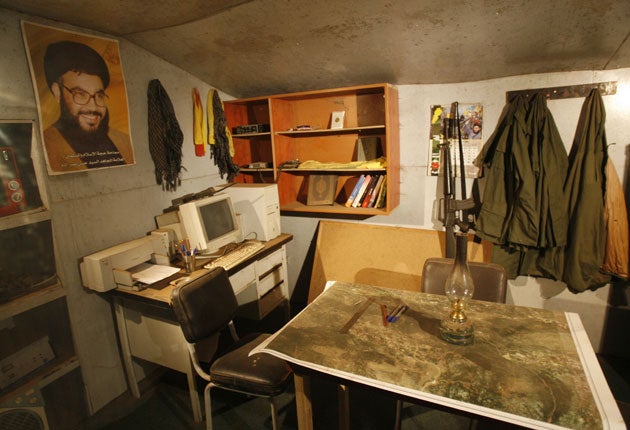Hezbollah theme park draws the crowds
The militant Shia group has turned a Lebanese hillside into a unlikely tourist landmark – complete with tanks, rockets and bunkers

If you have an urge to inspect mangled Israeli tanks, toy with a rocket launcher, or explore a genuine rock-cut guerrilla bunker, Hezbollah's multi-media theme park in south Lebanon is just the place.
The Shia Muslim group, which fought Israel to a stalemate four years ago and has been preparing for the next war ever since, has applied its creative flair to a "resistance tourist landmark" at Mleeta, a strategic hilltop bastion on what was once a front line with an Israeli-occupied "security zone".
Here, on the resort's oak-sheathed slopes, the nitty-gritty reality of life as a Hezbollah guerrilla is on display, replete with themes of patriotism and martyrdom, plus a dose of bombast. More than 500,000 people have flocked to Mleeta, 37 miles south-east of Beirut, since it opened in May.
Ali, 40, a part-time guide whose day job is in an Islamic bank in the nearby town of Nabatiyeh, said the sprawling resort had cost $4m (£3.2m) so far. Future plans envisage a five-star hotel, a camp site, swimming pools, sports clubs and eventually a cable car. The guides generally preach to the converted – the crowds are mainly Lebanese Shias, with a sprinkling of foreigners. "You believe in Hezbollah, you believe in your country, you believe you are strong," chirped Sara Nasser, from the southern village of Haris, saying the exhibit had filled her with pride.
Hezbollah, backed by Iran and Syria, emerged as a resistance force after Israel invaded Lebanon in 1982 to drive Palestine Liberation Organisation fighters from its northern border – and then stayed. The Lebanese guerrillas triumphed when the Israelis quit the south in 2000.
The Mleeta tour starts in a theatre showing a seven-minute video history of Hezbollah, with ear-splitting martial music. Then comes a museum displaying captured Israeli guns and gear. Wall panels offer a detailed anatomy of Israel's military machine and show satellite pictures – and map co-ordinates – of potential Hezbollah targets in the Jewish state.
Outside is a round sunken arena featuring wrecked Israeli tanks and artillery. A Merkava tank's gun has been artfully knotted. Large Hebrew letters spell out "The Abyss" and "The Swamp" in stone at the centre of the circle – taunts meant to be seen and photographed by Israeli spy planes, drones and satellites.
A trail, passing rockets hidden in the forest and life-sized models of Hezbollah fighters, leads to the mouth of an elaborate tunnel with a kitchen, prayer hall, operations room and living space for up to 30 men. The 300ft rocky passage, which emerges near a lookout point high above villages set in rolling hills, took three years to hack out of the limestone, Abu Abdullah, another guide, said.
Children played with an anti-aircraft gun, swivelling it up and down. Their father, Said Issa, a Palestinian from Lebanon's Ain al-Hilweh refugee camp, spoke admiringly of Hezbollah. "When we come here and see the resistance, and our brothers in Gaza and Nablus, we see them on the same path," he said.
In Mleeta, the path ends in "Liberation Square", a garden surrounded by Hezbollah guns and missiles. Stone steps climb up to an esplanade dedicated to the organisation's "martyrs". It seems a safe bet that the Israeli air force will flatten this place early in the next war, just as in 2006 it destroyed a museum in the village of Khiam where Israel's old allies in the South Lebanon Army had once run a prison and torture chamber.
The last conflict devastated many southern villages and the Shia suburbs of Beirut. It took the lives of more than 1,200 people in Lebanon, mainly civilians, and 158 Israelis, mostly soldiers, in 34 days of fighting that ended on 14 August 2006.
Khaled Jouni, who works in Dubai for a US tobacco firm, said he felt concerned about another conflagration in his native south Lebanon, but, thanks to Hezbollah, not frightened. "I'm so proud of what has been done to free the land," the sales manager said, adding that it was the guerrillas who had liberated his village, Roumin, from Israeli occupation. "Definitely, we don't want another war. We come to Lebanon because it's where you can party, go out, enjoy everything."
Mr Jouni, who describes himself as an atheist despite growing up in a pious Shia family, is unperturbed by Hezbollah's religious militancy or its emphasis on martyrdom. "I respect nothing like I respect the resistance," he said. "Even communists have martyrs. Che Guevara, heard of him?"
Join our commenting forum
Join thought-provoking conversations, follow other Independent readers and see their replies
Comments
Bookmark popover
Removed from bookmarks